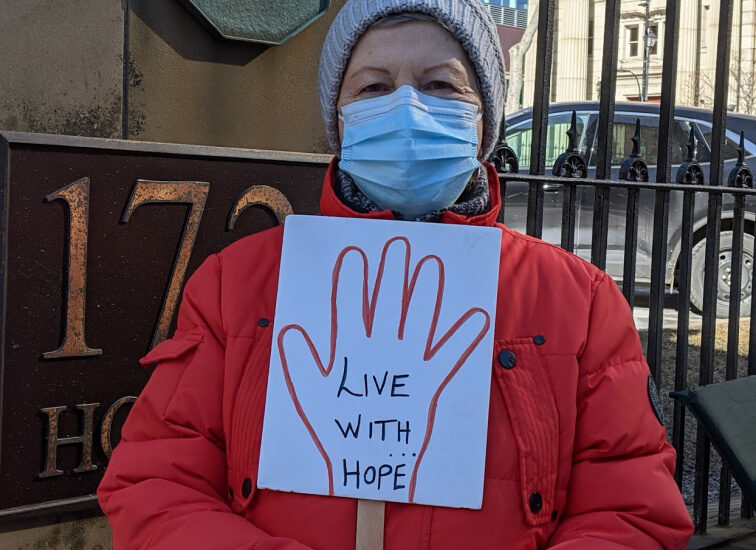
KJIPUKTUK (Halifax) – A new report by the Canadian Centre for Policy Alternatives-Nova Scotia (CCPA-NS), released Wednesday, is making nearly 100 recommendations to address affordable housing and homelessness crises across the province.
The report, Keys to a Housing Secure Future for all Nova Scotians, is a collaborative effort by the Housing For All Working Group, composed of over 50 “advocates and activists in housing and social justice, academics, and providers of non-profit housing, shelter, and community support services.”
The report sought an answer to the question: “What would it take to ensure that everyone has meaningful access to safe, permanently affordable, secure, supported and adequate housing in Nova Scotia?”
Using an intersectional lens, the report aims to significantly reduce income inequality in the province, where nearly one in four children live below the poverty line.
The report sends a stark reminder of the cost of government inaction on poverty, “costing Nova Scotia $2 billion per year in economic loss, $279 million in excess public service costs, and $231 million in foregone revenue.”
The kicker: The report’s 95 recommendations are cumulatively cheaper than the cost of government inaction.
Among the directives is a push to build or acquire 33,490 additional units of permanently affordable, non-market housing for Nova Scotians over a 10-year-plan.
Making Housing a Human Right
Colleen Cameron, Working Group Member of the Antigonish Poverty Reduction Coalition, played an active role in developing the report. She says homelessness is “just the tip of the iceberg” when it comes to affordable housing issues.
She says encompassing the social determinants of health is essential to create solutions for housing issues.
“Our health is determined mainly by the places we live, work, and play,” Cameron said. “Housing is at the very top of the list.”
Cameron retired from teaching at St. Francis Xavier University four years ago, but continues to play an active role in tackling housing issues.
A lack of transportation, like limited bus routes, can make accessing resources like hospitals, jobs, and grocery stores virtually impossible.
Cameron also worked on the Nova Scotia livable wage studies, which concluded the 2020 livable wage in Antigonish was $19.55/hour, up a whopping $2.25 since 2016.
“Antigonish has no shelters. No women’s shelters, no men’s shelters. If you’re in a housing crisis, you have to leave town. You have to go to Port Hawkesbury or New Glascow, or people end up going to Halifax which contributes to the housing crisis there,” Cameron said.
While there are truly 95 takeaways from this report, Cameron chalks them all up to one: making housing a human right.
In March 2021, the report notes, the NSNDP introduced the Housing as a Human Right bill, “which would require the government to develop actions and a timeline to end homelessness and housing insecurity.”
33,500 more affordable units over next ten years
The recommendations laid out in the report were “guided” by ten principles from the Social Policy Framework for Nova Scotia, including addressing climate justice, ensuring fiscal fairness, and redressing the legacies of colonialism, racism, and enslavement.
To provide more options for affordable housing, one recommendation is to build or acquire 33,490 additional units of non-market housing for Nova Scotians over a 10-year-period.
The Housing for All Working Group is calling for a Renters Assistance Program (RAP). They also want to see the poverty gap closed for Employment Support and Income Assistance (ESIA) recipients. Additionally, increasing the threshold for the Affordable Living Tax Credit (ALTC) by 25% and raising the NS Child Benefit (NSCB) by 10% per child, “would lift at least 8,000 people out of poverty.”
With 32,490 renter households in Nova Scotia in core housing need, 30,475 of those live in unaffordable housing. The province has an additional 4,880 (15%) renters in housing requiring major repair, and 2,385 (7%) live in unsuitable conditions.
The recommendations also suggest shifting rental housing away from the private, for-profit sector, noting a recent CMHC survey found only 12,341 units of public housing in Nova Scotia. Additionally, “Census data show that only 12.3% of renters live in subsidized housing.”
While provincial numbers were not available, the report shows the homelessness crisis in Nova Scotia is not exclusive to Halifax. Data from 2021 in West Hants, Kings County, and Annapolis County, for example, found 247 people either at-risk of, or experiencing, homelessness.
Livable wage, paid sick days, strengthened tenancy act, and more
Ensuring Nova Scotians earn a livable wage is paramount to providing affordable housing. The federal government announced in the 2021 budget an increase to $15/hour for “workers in federally regulated industries,” giving a raise to 26,000 workers across the country. That number “does not go far enough,” the report says, noting the minimum wage in Nova Scotia sits at $12.95, more than $6 short of a livable wage.
The report calls for an expansion of workers rights, “including providing at least 10 paid sick days, nine paid statutory holidays and a 40-hour standard work week.”
The CCPA-NS urges a number of changes to strengthen the Residential Tenancy Act, including making, “fixed term leases … automatically converted to month-to-month agreements upon their expiry unless the tenant gives three months notice to quit prior to the expiration of the lease.”
Additionally, “to broaden access, landlords must not be permitted to ask about sources of income, landlord history for newcomers, references, debt information, social insurance number, conviction and/or arrest history, eviction history, and credit score.”
The report describes a broad range of benefits that come with supportive housing: “Lower risk of hospitalization, improved overall health and educational attainment, reduced exposure to violence, increased likelihood of employment, reduced reliance on social assistance, and reduced substance use and improved quality of life.”
Support for people with disabilities is desperately needed in the province. Statistics Canada noted in 2018 that 80% of persons with a disability live in poverty in Canada, and 30.4% of Nova Scotians have a disability, “the highest percentage in the country and higher than the national average.”
Supports for refugees are necessary as well, according to the report, as “they are not eligible for public housing, rent supplements or housing allowances.” Refugees are also ineligible “to participate in provincially-funded programs including GED, language, employment readiness and computer literacy training.”
On the climate justice front, one recommendation would require “all existing housing belonging to low-income homeowners to have substantial energy efficiency retrofits and cold climate heat pumps installed by 2030 at no cost to the low-income homeowner.”
Several recommendations encourage the return of co-operative housing in the province. Canada currently has 2,212 housing co-operatives with 92,526 units, 69 of the co-ops and 1,718 homes in Nova Scotia.
Other recommendations aim to combat environmental racism, such as prohibiting the development of affordable housing for Mi’kmaw or African Nova Scotian communities near toxic sites.
The report features staggering statistics, noting that, “Between 2006 and 2016, the African Nova Scotian population in the North End fell by half—and as many as 700 residents moved away from the lands they resided for many generations. This accounts for a greater number than those who lived in Africville.”
Criminal justice reform will also be a necessary component to creating a housing-secure future, according to the CCPA-NS. One problematic policy requires “people find accomodation before being released from prison” in Nova Scotia.
There will be a community launch of the report on Thursday May 27, at 6:30 pm
See also: Gentrification and income inequality the Halifax way – An interview with professor Howard Ramos
Check out our new community calendar!
With a special thanks to our generous donors who make publication of the Nova Scotia Advocate possible.
Subscribe to the Nova Scotia Advocate weekly digest and never miss an article again. It’s free!



